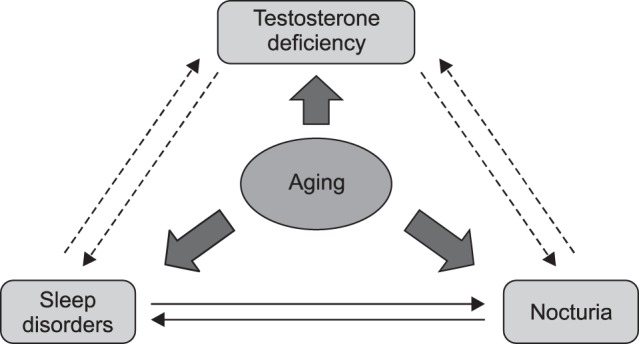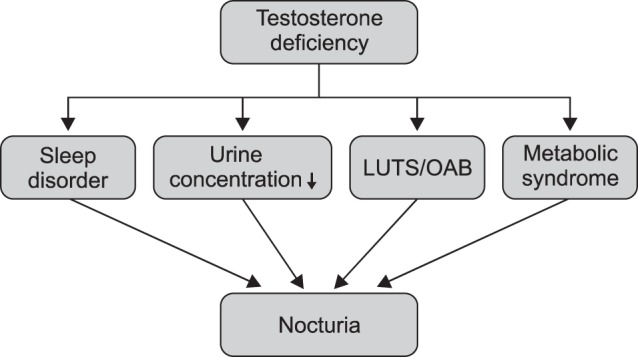World J Mens Health.
2017 Apr;35(1):14-21. 10.5534/wjmh.2017.35.1.14.
Testosterone Deficiency and Nocturia: A Review
- Affiliations
-
- 1Department of Integrative Cancer Therapy and Urology, Kanazawa University Graduate School of Medical Science, Kanazawa, Japan. kshigehara0415@yahoo.co.jp
- 2Department of Urology, Hasegawa Hospital, Toyama, Japan.
- KMID: 2377207
- DOI: http://doi.org/10.5534/wjmh.2017.35.1.14
Abstract
- Nocturia causes lack of sleep and excessive daytime somnolence, reducing overall well-being, vitality, productivity, and mental health. Nocturia is significantly associated with testosterone deficiency, lower urinary tract symptoms (LUTS), and sleep disorders. The development of LUTS is commonly associated with testosterone deficiency in elderly men, and recent studies have suggested that testosterone has an ameliorative effect on nocturia. In hypogonadal men with nocturia, a negative feedback cycle can arise, in which testosterone deficiency leads to the development of nocturia, and nocturia contributes to the decline in testosterone levels. Therefore, patients with nocturia should receive appropriate treatment in order to improve their quality of life. Nocturia is generally treated by restricting nighttime water intake, as well as by the administration of medications, such as alpha-1 blockers, anticholinergic drugs, and desmopressin. Testosterone replacement therapy (TRT) is used worldwide as a treatment for many hypogonadal conditions. TRT represents an alternative treatment option for nocturia in hypogonadal men. However, limited information is currently available regarding the effects of TRT on nocturia in hypogonadal men, and further studies are required to reach more definitive conclusions.
MeSH Terms
Figure
Cited by 2 articles
-
Sleep, Sleep Disorders, and Sexual Dysfunction
Jae Wook Cho, Jeanne F. Duffy
World J Mens Health. 2019;37(3):261-275. doi: 10.5534/wjmh.180045.Impact of Testosterone Deficiency and Testosterone Therapy on Lower Urinary Tract Symptoms in Men with Metabolic Syndrome
Abdulmaged M. Traish, Vanessa Johansen
World J Mens Health. 2018;36(3):199-222. doi: 10.5534/wjmh.180032.
Reference
-
1. van Kerrebroeck P, Abrams P, Chaikin D, Donovan J, Fonda D, Jackson S, et al. The standardisation of terminology in nocturia: report from the Standardisation Sub-committee of the International Continence Society. Neurourol Urodyn. 2002; 21:179–183. PMID: 11857672.
Article2. Kobelt G, Borgström F, Mattiasson A. Productivity, vitality and utility in a group of healthy professionally active individuals with nocturia. BJU Int. 2003; 91:190–195. PMID: 12581002.
Article3. Asplund R, Marnetoft SU, Selander J, Akerström B. Nocturia in relation to somatic health, mental health and pain in adult men and women. BJU Int. 2005; 95:816–819. PMID: 15794789.
Article4. Nakagawa H, Niu K, Hozawa A, Ikeda Y, Kaiho Y, Ohmori-Matsuda K, et al. Impact of nocturia on bone fracture and mortality in older individuals: a Japanese longitudinal cohort study. J Urol. 2010; 184:1413–1418. PMID: 20727545.
Article5. Kim SO, Choi HS, Kim YJ, Kim HS, Hwang IS, Hwang EC, et al. Impact of nocturia on health-related quality of life and medical outcomes study sleep score in men. Int Neurourol J. 2011; 15:82–86. PMID: 21811697.
Article6. Homma Y, Yamaguchi O, Hayashi K. Neurogenic Bladder Society Committee. Epidemiologic survey of lower urinary tract symptoms in Japan. Urology. 2006; 68:560–564. PMID: 16979726.
Article7. Tikkinen KA, Tammela TL, Huhtala H, Auvinen A. Is nocturia equally common among men and women? A population based study in Finland. J Urol. 2006; 175:596–600. PMID: 16407003.
Article8. Asplund R. Nocturia in relation to sleep, somatic diseases and medical treatment in the elderly. BJU Int. 2002; 90:533–536. PMID: 12230611.
Article9. Fitzgerald MP, Litman HJ, Link CL, McKinlay JB. BACH Survey Investigators. The association of nocturia with cardiac disease, diabetes, body mass index, age and diuretic use: results from the BACH survey. J Urol. 2007; 177:1385–1389. PMID: 17382738.
Article10. Yoshimura K, Terada N, Matsui Y, Terai A, Kinukawa N, Arai Y. Prevalence of and risk factors for nocturia: analysis of a health screening program. Int J Urol. 2004; 11:282–287. PMID: 15147543.
Article11. Harman SM, Metter EJ, Tobin JD, Pearson J, Blackman MR. Baltimore Longitudinal Study of Aging. Longitudinal effects of aging on serum total and free testosterone levels in healthy men. J Clin Endocrinol Metab. 2001; 86:724–731. PMID: 11158037.
Article12. Lunenfeld B, Mskhalaya G, Zitzmann M, Arver S, Kalinchenko S, Tishova Y, et al. Recommendations on the diagnosis, treatment and monitoring of hypogonadism in men. Aging Male. 2015; 18:5–15. PMID: 25657080.
Article13. Bassil N, Alkaade S, Morley JE. The benefits and risks of testosterone replacement therapy: a review. Ther Clin Risk Manag. 2009; 5:427–448. PMID: 19707253.14. Huhtaniemi I. Late-onset hypogonadism: current concepts and controversies of pathogenesis, diagnosis and treatment. Asian J Androl. 2014; 16:192–202. PMID: 24407185.
Article15. Shigehara K, Namiki M. Late-onset hypogonadism syndrome and lower urinary tract symptoms. Korean J Urol. 2011; 52:657–663. PMID: 22087358.
Article16. Karazindiyanoğlu S, Cayan S. The effect of testosterone therapy on lower urinary tract symptoms/bladder and sexual functions in men with symptomatic late-onset hypogonadism. Aging Male. 2008; 11:146–149. PMID: 18821291.17. Shigehara K, Sugimoto K, Konaka H, Iijima M, Fukushima M, Maeda Y, et al. Androgen replacement therapy contributes to improving lower urinary tract symptoms in patients with hypogonadism and benign prostate hypertrophy: a randomised controlled study. Aging Male. 2011; 14:53–58. PMID: 21171937.
Article18. Wittert G. The relationship between sleep disorders and testosterone in men. Asian J Androl. 2014; 16:262–265. PMID: 24435056.
Article19. Schmid SM, Hallschmid M, Jauch-Chara K, Lehnert H, Schultes B. Sleep timing may modulate the effect of sleep loss on testosterone. Clin Endocrinol (Oxf). 2012; 77:749–754. PMID: 22568763.
Article20. Oh MM, Kim JW, Jin MH, Kim JJ, Moon du G. Influence of paradoxical sleep deprivation and sleep recovery on testosterone level in rats of different ages. Asian J Androl. 2012; 14:330–334. PMID: 22157981.
Article21. Liao CH, Chiang HS, Yu HJ. Serum testosterone levels significantly correlate with nocturia in men aged 40-79 years. Urology. 2011; 78:631–635. PMID: 21782223.
Article22. Kim JW, Oh MM, Yoon CY, Bae JH, Kim JJ, Moon du G. Nocturnal polyuria and decreased serum testosterone: is there an association in men with lower urinary tract symptoms? Int J Urol. 2014; 21:518–523. PMID: 24286364.
Article23. Kim MK, Zhao C, Kim SD, Kim DG, Park JK. Relationship of sex hormones and nocturia in lower urinary tract symptoms induced by benign prostatic hyperplasia. Aging Male. 2012; 15:90–95. PMID: 22385128.
Article24. Liu HY, Chung MS, Wang HJ, Liu RT, Chuang YC. Nocturia indicates a poor health status and increases mortality in male patients with type 2 diabetes mellitus. Int Urol Nephrol. 2016; 48:1209–1214. PMID: 27156073.
Article25. Wu Y, Pan H, Wang WM, Xu D, Zhang L, Gu ZQ, et al. A possible relationship between serum sex hormones and benign prostatic hyperplasia/lower urinary tract symptoms in men who underwent transurethral prostate resection. Asian J Androl. 2017; 19:230–233. PMID: 26763548.
Article26. Kim JW, Chae JY, Kim JW, Yoon CY, Oh MM, Park HS, et al. Can treatment of nocturia increase testosterone level in men with late onset hypogonadism? Urology. 2014; 83:837–842. PMID: 24680454.
Article27. Jeh SU, Yoon S, Seo DH, Lee SW, Lee C, Choi SM, et al. Relationship between serum testosterone and nocturia in men without benign prostate enlargement. Andrology. 2017; 5:58–62. PMID: 27636882.
Article28. Yoo SS, Shim BS, Lee DH, Lee HW, Yoon H. Correlation between nocturia and sleep: a questionnaire based analysis. Korean J Urol. 2010; 51:757–762. PMID: 21165195.
Article29. Luboshitzky R, Zabari Z, Shen-Orr Z, Herer P, Lavie P. Disruption of the nocturnal testosterone rhythm by sleep fragmentation in normal men. J Clin Endocrinol Metab. 2001; 86:1134–1139. PMID: 11238497.
Article30. Barrett-Connor E, Dam TT, Stone K, Harrison SL, Redline S, Orwoll E. Osteoporotic Fractures in Men Study Group. The association of testosterone levels with overall sleep quality, sleep architecture, and sleep-disordered breathing. J Clin Endocrinol Metab. 2008; 93:2602–2609. PMID: 18413429.
Article31. Paul KN, Laposky AD, Turek FW. Reproductive hormone replacement alters sleep in mice. Neurosci Lett. 2009; 463:239–243. PMID: 19647784.
Article32. Shigehara K, Konaka H, Koh E, Izumi K, Kitagawa Y, Mizokami A, et al. Effects of testosterone replacement therapy on nocturia and quality of life in men with hypogonadism: a subanalysis of a previous prospective randomized controlled study in Japan. Aging Male. 2015; 18:169–174. PMID: 26075538.
Article33. Liu PY, Yee B, Wishart SM, Jimenez M, Jung DG, Grunstein RR, et al. The short-term effects of high-dose testosterone on sleep, breathing, and function in older men. J Clin Endocrinol Metab. 2003; 88:3605–3613. PMID: 12915643.
Article34. Hanafy HM. Testosterone therapy and obstructive sleep apnea: is there a real connection? J Sex Med. 2007; 4:1241–1246. PMID: 17645445.
Article35. Pávó I, Varga C, Szücs M, László F, Szécsi M, Gardi J, et al. Effects of testosterone on the rat renal medullary vasopressin receptor concentration and the antidiuretic response. Life Sci. 1995; 56:1215–1222. PMID: 7475899.
Article36. Herzberg NH, Goudsmit E, Kruisbrink J, Boer GJ. Testosterone treatment restores reduced vasopressin-binding sites in the kidney of the ageing rat. J Endocrinol. 1989; 123:59–63. PMID: 2809490.
Article37. Pak TR, Chung WC, Hinds LR, Handa RJ. Estrogen receptor-beta mediates dihydrotestosterone-induced stimulation of the arginine vasopressin promoter in neuronal cells. Endocrinology. 2007; 148:3371–3382. PMID: 17412808.38. Ikeda Y, Tanaka I, Oki Y, Gemmma R, Morita H, Komatsu K, et al. Testosterone normalizes plasma vasopressin response to osmotic stimuli in men with hypogonadism. Endocr J. 1993; 40:387–392. PMID: 7920892.
Article39. Laaksonen DE, Niskanen L, Punnonen K, Nyyssönen K, Tuomainen TP, Valkonen VP, et al. Testosterone and sex hormone-binding globulin predict the metabolic syndrome and diabetes in middle-aged men. Diabetes Care. 2004; 27:1036–1041. PMID: 15111517.
Article40. Mitterberger M, Pallwein L, Gradl J, Frauscher F, Neuwirt H, Leunhartsberger N, et al. Persistent detrusor overactivity after transurethral resection of the prostate is associated with reduced perfusion of the urinary bladder. BJU Int. 2007; 99:831–835. PMID: 17244278.
Article41. McVary KT. Erectile dysfunction and lower urinary tract symptoms secondary to BPH. Eur Urol. 2005; 47:838–845. PMID: 15925081.
Article42. Azadzoi KM, Tarcan T, Kozlowski R, Krane RJ, Siroky MB. Overactivity and structural changes in the chronically ischemic bladder. J Urol. 1999; 162:1768–1778. PMID: 10524933.
Article43. Saad F, Gooren LJ, Haider A, Yassin A. A dose-response study of testosterone on sexual dysfunction and features of the metabolic syndrome using testosterone gel and parenteral testosterone undecanoate. J Androl. 2008; 29:102–105. PMID: 17916569.
Article44. Kalinchenko S, Vishnevskiy EL, Koval AN, Mskhalaya GJ, Saad F. Beneficial effects of testosterone administration on symptoms of the lower urinary tract in men with late-onset hypogonadism: a pilot study. Aging Male. 2008; 11:57–61. PMID: 18570056.
Article45. Amano T, Imao T, Takemae K, Iwamoto T, Nakanome M. Testosterone replacement therapy by testosterone ointment relieves lower urinary tract symptoms in late onset hypogonadism patients. Aging Male. 2010; 13:242–246. PMID: 20795793.
Article
- Full Text Links
- Actions
-
Cited
- CITED
-
- Close
- Share
- Similar articles
-
- Book Review: Androgen Deficiency and Testosterone Replacement: Current Controversies and Strategies
- Testosterone therapy in men with testosterone deficiency: Are we beyond the point of no return?
- Correlation Between Testosterone Replacement Treatment and Lower Urinary Tract Symptoms
- Practical Tip for Management of Nocturia
- Testosterone Deficiency Associated with Poor Glycemic Control in Korean Male Diabetics



